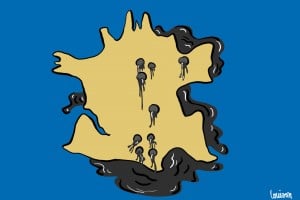Earlier this month, members of the French national assembly voted to ban hydraulic fracturing (a.k.a. fracking) by an overwhelming 287 to 186. While the vote had significant support across party lines, a great deal of skepticism remains about whether or not the unconventional gas drilling ban goes far enough and if it will actually stop drillers from fracking.
Between 2008 and 2010, the French government granted numerous exploration permits to companies claiming that drilling for unconventional gas trapped in shale rock offered a silver bullet solution to growing economic and climate change pollution challenges. But more recently the public learned about several threats posed by unconventional gas drilling, including impacts on public health, drinking water supplies, and a much larger pollution footprint than previously assumed. As a result, governments around the world are changing course and banning unconventional gas fracking.
This seemed to be the direction in France too when, earlier this year, the government commissioned a report to critically examine the economic, environmental and social impacts of exploiting unconventional gas. In mid-April, Prime Minister Francois Fillon even stated that fracking for unconventional gas is risky and that he supported rescinding the drilling permits and wanted a ban.
Just days later, however, on April 21st, a preliminary version of the report [pdf] was submitted to Ecology Minister Nathalie Kosciusko-Morizet and Industry Minister Eric Besson and surprisingly, it highlighted the benefits from fracking. The pre-report warned that a ban would be detrimental to the economy and that unconventional gas should be pursued under specific conditions.
Now, concerned French citizens, environmentalists and opposition party politicians are claiming that dirty energy lobbyists are influencing the country’s drilling regulations. As one example, they point to the rosy outlook of the pre-report, which was heavily edited.
France Nature Environnement describes the report as whitewash, stating:
“…if after submitting evidence to the inter ministerial task-force, we anticipated a more favourable report on the exploitation of shale gas we did not at all expect such a caricature of a report, one which almost without any qualification, appears interested in just one outcome — to make shale gas drilling acceptable to the French.”
On the legislative side, opposition parties continue to argue that the anti-fracking law is too watered down and falls short because of an amendment providing a major loophole which may still allow for fracking. Gas companies that were granted permits have two months to explain how they will drill for unconventional gas, and the now-flawed legislation theoretically would allow companies to simply not describe their drilling technique as fracking, therefore holding on to their permits. In other words, if they simply stop talking about fracking and describe the drilling process more vaguely, they could go on about their business as usual.
Richard Paul-Jones of Schiste Happens, sums up the issues well noting that “if the companies come up with any method other than hydraulic fracturing, they will retain their licenses without further inquiry.”
The Connexion put it more clearly:
“The text that is being debated today with a vote tomorrow now gives licensees two months to detail the processes they intend to use and, while hydraulic fracturing will not be permitted, if this is not mentioned in the companies’ submissions then the permits will be approved.”
In fact, prior to voting to support the legislation, many believed that a united opposition would vote against the ban because it did not go far enough.
The French centre-left has its own fracking ban ready for debate. For now they have removed their bill but will bring it up again if they see the present legislation further watered down and think fracking is back on the table. The existing UMP bill to ban fracking next moves to the Senate in June.
In the meantime, parliamentarians from all parties have the chance to review the bill as it is written and to consider the entirety of its implications. France would do well to follow the proposed ban in New Jersey, the moratorium in Maryland, New York’s temporary ban, and others. France should also thoroughly study the condemnations fracking has received in Québec and the embarrassment that government has received for its poor management of unconventional gas reserves.
Subscribe to our newsletter
Stay up to date with DeSmog news and alerts







